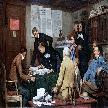

- Category :Parenting
Children have no natural fear of dental treatment. The attitude a child develops about dentistry originates in the home. According to one clinical study the fear most adults have of dentistry is based on what their parents told them.
Prepare the child
Children have no natural fear of dental treatment. The attitude a child develops about dentistry originates in the home. According to one clinical study the fear most adults have of dentistry is based on what their parents told them.
Prepare the child
Meeting the dentist can become a happy adventure when the child is encouraged in a cheerful manner. Pleasantly explain the dentist’s role in helping teeth stay healthy and pretty. Paint a friendly picture of the dentist. After consulting with the dentist about his general policy regarding first appointments, you can tell your child in exciting, simple terms what to expect.
Children’s dental specialists, known as paedodontists, and general dentists who treat children want to make the child’s first visit a happy experience.
Some dentists give their new patients a short tour of the clinic. Others limit the first visit to a visual examination. Parents can explain this as a simple counting of the child’s teeth. The extent of the first appointment depends on the patient, as well as the dentist. Some dentists take x-rays or “pictures.” Others like to clean the teeth on the first appointment. Children are usually delighted to learn that this will make their teeth bright and shiny. Fluoride may be applied on the teeth to prohibit decay. The dentist explains that this makes the teeth harder, helping to prevent cavities.
The importance of early brushing
After seeing the child and performing the simple examination procedures the dentist instructs the parent and child on proper home care. Most children cannot do an adequate job of brushing on their own. While it is important that the habit of daily brushing is instilled at an early age, it is necessary for the parent to give the child’s teeth a thorough cleansing each night before bedtime. Brushing should start with the appearance of the first tooth and should be done at least twice a day. Your dentist may recommend a particular type of toothbrush or method, but generally a soft brush with straight bristles should be used in the direction of teeth growth. Brush down on the upper teeth, and up on the lower teeth, and use a scrubbing motion on the chewing surfaces. Remember to clean all accessible areas of the teeth. The best habit to establish is brushing immediately after eating.
The dentist may also suggest a diet to reduce the possibility of decay. Between-meal snacks should be discouraged, particularly those containing sugar and fermentable carbohydrates such as cookies. Provide balanced meals with plenty of fresh vegetables, a variety of fruits, and milk.
If the child doesn’t live in a community where the water is fluoridated, or has not the benefit of this since birth, supplemental fluoride vitamins may be recommended. Studies have shown that tooth decay is reduced up to 65 percent in communities with fluoridated water. Fluoride is just as important as a controlled diet, frequent brushing, and regular professional care.
-
Previous
Importance Of Friendship
Related Articles
8 Strategies For Effective Co-parenting
The article focuses on how to raise up your kids when couples get a divorce.The co-parenting involves issues like parenting time schedules, decision-making responsibilities, and related financial matters, like supporting your children..
Flirty Questions To Ask A Boy You Like
Some flirty but interesting questions you can ask a guy you have a crush on.
How To Deal With Childhood Onset Schizophrenia
Here is a guide to parents and family who have a child with schizophrenia. The article gives insightful information about the ways to handle this neurological mental disorder..








